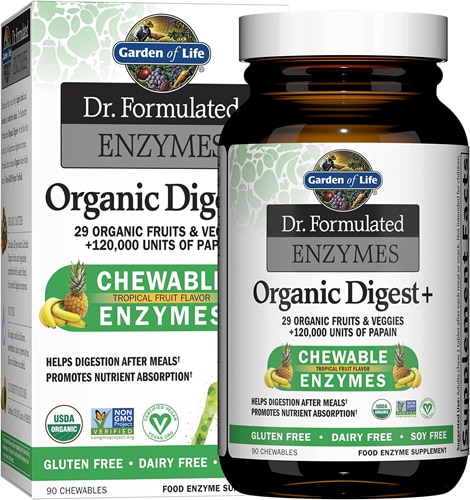If you struggle with digestive distress, many types of food—even healthy kinds—may seem like your worst enemy. Or you might have found that foods that previous posed you no difficulty all of the sudden have you clutching at your tummy.
Whatever the case, if your digestion has you in the dumps, you’re in good company: According to a 2013 survey, almost three fourths of Americans are living with digestive symptoms like diarrhea, gas, bloating and abdominal pain. But you may be able to have your cake and find relief too. As the ranks of the bloated swell, people are taking a commensurate interest in supplemental digestive enzymes.
A trifecta of enzymes
What are digestive enzymes? When our bodies are working on all cylinders, our digestive system employs roughly 22 different digestive enzymes to help us break down our food into nutrients. These enzymes facilitate specific chemical reactions to enhance the food’s absorption and utilization.
Humans produce multiple different enzymes during the different stages of the digestive process: first in the mouth, followed by the stomach, and then in the final stage, within the small intestine.
There are three main kinds of enzymes that help break down carbohydrates, proteins and fats, respectively. As soon as we start chewing, salivary amylase begins turning carbs into sugars. In the stomach, pepsin initiates protein digestion, turning it into amino acids, and then gets more help from other protein enzymes such as trypsin, pancreatic amylase and peptidase. To facilitate fat absorption, lipases secreted in the mouth and stomach tackle fats and oils.
Each enzyme has a very specific job description with no crossover—each enzyme will only incite a reaction with its designated food type.
Why take a supplement?
If our system is compromised, because of certain conditions, food intolerances or aging, some foods prove particularly challenging to smooth digestion. Enter the ignoble signs of a flare-up: farting, belching and bloating. At this point, many of us reach for the antacids.
But our inability to digest certain foods may have less to do with excess acid and more to do with enzyme function. Although antacids may provide a temporary respite, in the long term they may do more harm than help, ultimately inhibiting nutrient absorption, among other drawbacks.
This is where supplemental digestive enzymes come in, offering a much gentler and less invasive solution. “Digestive enzymes basically speed up the breakdown of macronutrients,” says Brigid Titgemeier, MS, RDN, LD, a functional medicine practitioner based in Cleveland, Ohio. For those battling a perpetual stomachache, supplementing with over-the-counter digestive enzymes, especially in the short term, helps provide key digestive relief that allows the body to marshal its resources toward healing.†
But before deciding whether you want to explore digestive enzymes, Titgemeier suggests most people start with something they tend to overlook—how much they chew their food. If you think of digestive enzymes as scissor-like proteins cutting food down in size, chewing is your first line of defense. “One of the main things that can trigger not having proper enzyme function is not chewing your food properly,” she says. “The larger molecules that accumulate in the intestine can lead to bad bacteria. The rule of thumb for chewing is to chew each bite 20-30 times.”
If you are still having issues, the next step would be to consult a doctor to see if digestive enzymes are a good fit. Certain conditions, such as cystic fibrosis, actually require supplementation with enzymes (pancreatic insufficiency is a signature of the disease). People with chronic pancreatitis, or have underwent pancreatic surgery; people who have liver disease, and those with hypochlorhydria (a lack of stomach acid) are also prime candidates for supplemental enzymes.†
One of the most common objections to supplementation is that the body can produce all the digestive enzymes it needs. However, stress and poor nutrition can be catalysts for enzyme shortages. Lactase deficiency is another example of a widespread digestive enzyme shortage—it occurs in as much as 70 percent of the world’s adult population. Plus, as we age, enzyme production slows.
The upshot? You don’t need an overt enzyme deficiency to benefit from over the counter digestive enzymes. Digestive enzymes can take the stress off any type of digestive issues such as gas, bloating, acid reflux, diarrhea, constipation and more. If you feel consistently gassy after meals, or that your food just sits in your stomach for hours after you eat, you may want to give enzymes a try.
Benefits of digestive enzymes
Here are three ways they can amp up a sluggish digestion and increase your nutrient absorption.
Energy support
“Since you are utilizing your food properly, you may find you have more energy,” says Titgemeier. Lethargic digestion robs the body of energy it could put toward other metabolic functions. Digestive enzymes can help convert carbs into glucose--the primary sugar molecule that the body uses for energy. A supplement that contains amylase may help you with the efficient conversion of carbohydrates into fuel.†
Healthy inflammatory response
Proteolytic enzymes are bromelain, papain, pancreatin, trypsin, chymotrypsin, and rutin breakdown protein into smaller polypeptides or amino acids. Also known as proteases, these enzyme help digest the protein found in meats, poultry, fish, nuts, eggs and cheese. Because proteases make protein more bioavailable, they are linked to multiple protein interactions such as circulation, inflammatory response and immune function.†
Implications for healthy weight support
Research on lipase, the enzyme that breaks down fat, is especially promising in terms of influencing weight. In 2012, scientists were able to make lipase three times as effective by manipulating a molecular “switch” that turns the enzyme on and off. In general, enzymes may help with weight loss by speeding digestion and supporting metabolism. An optimized digestive system can translate into less inflammation and toxic stagnation and therefore less excess weight.†
Choosing the right type of digestive enzyme
Unless you have an overt enzyme deficiency, you want to provide auxiliary support to the entire digestive process. A good place to start is with a “broad spectrum” formula that covers all the bases—a blend of the key enzyme players, such as amylase, protease and lipase.
A holistic approach to digestion
Titgemeier cautions a conservative approach to enzymes, such as using them for backup help for a few months. “Treat them as a temporary bandaid—but don’t neglect to investigate why your ability to secrete your own digestive enzymes is compromised.”
One way we impair our digestion is by eating too much cooked food, she says. “Raw food contains more enzymes and is beneficial for stimulating digestive enzymes.” Don’t go overboard with raw either, as that present its own set of challenges for digestion.
A combo of raw and cooked foods, plus a wide variety of fruits and vegetables, along with some good sources of probiotics, are the building blocks for an optimized digestive process. Once your digestion resumes a robust rhythm, opt for enzyme supplements on an as-needed basis.
†These statements have not been approved by the Food and Drug Administration. These products are not intended to diagnose, treat, cure or prevent disease.




